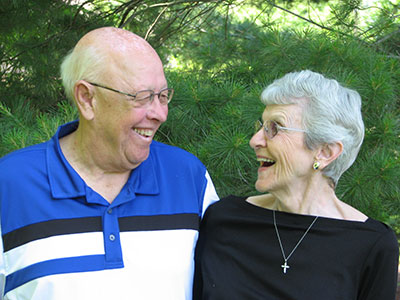
Alvina and Pat Runde
How did Alvina Runde survive Stage 3C ovarian cancer? Lots of prayers, lots of friends and top physicians at the UW Carbone Cancer Center who also have become friends, she and her husband, Pat, agreed.
What are they doing to improve the odds for the next women who are diagnosed? Making gifts as they can to the gynecologic oncology research program. “We hope they find out what causes it,” said Alvina Runde, who shared her story at the 2012 Sparkle of Hope, a fundraiser for gynecologic cancer research. “People should know the symptoms. Women know their bodies best and when they sense changes or out of the ordinary feelings, they must pursue this until they are satisfied. Early detection is essential for a good outcome.”
The gifts, including an Individual Retirement Account (IRA) required minimum distribution, also recognize the couple’s gratitude for Alvina’s care. “We’ve been very, very pleased with all our experiences at the UW Carbone Cancer Center,” Pat Runde said. “The fact that 13 years later we can sit here and talk about it means a lot to us.”
Alvina Runde’s cancer journey began with lower abdominal pain 14 years ago. Six months after her primary care physician diagnosed anxiety and depression, she visited a gastroenterologist and a subsequent colonoscopy showed a stricture around part of the colon. A CT scan did not show a tumor, but a physical exam detected a growth that her gynecologist said was not benign. He referred her to the University of Wisconsin Carbone Cancer Center, where she saw Dr. Julian Schink, a gynecologic oncologist on Tuesday, Jan. 25, 2000. She checked into UW Hospital Wednesday and had major surgery that Thursday followed by extensive chemotherapy.
The operation involved removing several organs and going through the entire colon to pick off visible bits of tumor, and Schink explained that thorough debulking is key to long-term success. “We shared (the cancer experience) with as many people as we could,” Pat Runde said. “Your support group makes you feel better.”
The cancer returned three years later leading to more chemotherapy, and Alvina Runde remains under the follow-up care of Dr. Ellen Hartenbach, a gynecologic oncologist and assistant professor in the UW-Madison Department of Obstetrics and Gynecology, Division of Gynecologic Oncology. In 2010, after surgery to remove another tumor on the spleen and pancreas, Alvina suffered a quickly-controlled bout of internal bleeding. “Ever since then, I have been doing OK,” she said, adding the cancer is something she thinks about every day. After 13 years of continual follow-up, she said the care has been amazing.
Sitting in their light-filled sitting room overlooking a small wood on the edge of Madison, the Rundes are most of all grateful, especially for the time they can spend with their three grandchildren – twin energetic eight-year-old grandsons and a four-year-old granddaughter with a sparkle in her eye. Alvina Runde wasn’t sure she’d ever live to see them.
“I wanted to live to see my son get married,” she said after the first surgery. And she did. “I wanted to live to see grandchildren,” she said after the second. She did that, too. She also promised God that, if she survived the first surgery, she would go to church an extra day a week. She’s fulfilled that promise almost every Tuesday morning since then.
Now, the Rundes want to live as long as they can to watch their grandchildren grow up. They do not, however, want to move to New Hampshire to be closer to the family because the U.W. Carbone Cancer Center is in Madison. “We feel very fortunate,” Pat Runde said. “We feel very fortunate to live 20 minutes from the Cancer Center. The whole experience of cancer has been kind of unnerving, but the care and skill of the physicians has more than off-set that”
The couple made their first gift to the gynecological oncology research in 2003. “Now, that’s one of our charities,” she said. This year, the gift was part of an IRA distribution, a legal requirement for those who are 70 ½ or older. “There’s a provision that you can make a direct gift from part of that distribution,” Pat Runde said. It’s a nice device, and it adds up to a nice deduction because it’s not declared as income.”
The gifts provide a way for the couple to help cancer research, Pat Runde said. “We do what we can. … We want to stay connected.”
Sparkle of Hope Benefit for Gynecologic Cancer
Please join us on October 3rd for a uniquely exciting and entertaining evening to raise much needed research and patient care dollars for the Gynecological Cancer Program at the UW Carbone Cancer Center.
